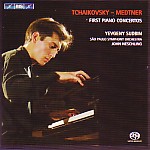You know you’ve got a winner on your hands when a performance of a piece you know by heart and already own in dozens of recordings makes you sit up and listen to it with fresh ears. That’s exactly what happened at the opening of this Tchaikovsky First Concerto. Yevgeny Sudbin attacks those pounding “Liberace” chords with virtuoso relish–and thanks to a little arpeggio action in the right hand at the top of each sequence, with a glint of humor as well. This devil-may-care opening turns out to be a bit deceptive, though, for what characterizes the remainder of the performance is Sudbin’s willingness to engage the orchestra in a real dialog. Mind you, nothing is precious or mannered: he simply knows where his part fits into the overall texture, and in places such as the second subject of the first movement and the entire Andante, he lets his colleagues in the wind and string sections have their say and reacts accordingly.
The result, while never short-changing the virtuoso elements (particularly in the finale), has a give-and-take that few other versions match. There are a couple of brief spots in the first movement where the tension does drop a bit as Sudbin lapses into dreamy reverie, but otherwise this is as persuasive a performance of this warhorse as any on disc. The orchestra and conductor have just as much to offer as the soloist, being totally at one with the interpretive concept and wholly characterful in their collective response. I would have loved to have heard this live.
The Medtner First Concerto, a 34-minute single-movement post-Romantic effusion that no one seems to like very much, also receives an enormously powerful and convincing performance. Sudbin must be almost unique in the arts world in that his liner-note writing is every bit as good as his piano playing, which is saying a lot. He makes a strong case for the work and guides the listener through its twists and turns with clarity and enthusiasm. Yet despite his professions of love for the piece, the sincerity of which I do not question, it says something that he has to spend three times the space talking about it than he does the Tchaikovsky. In short, it requires a measure of special pleasing. And yet it really shouldn’t. Yes, it may sound in places like Rachmaninov without the tunes, but there’s nothing radical or off-putting about Medtner’s style.
Perhaps he stresses form over immediacy of emotional expression, and the bottom line is that it’s not easy to grasp a single-movement form lasting longer than half an hour on casual acquaintance. But if you make the effort, you will discover an impressively grand, turbulent work that progresses from tragedy to defiant triumph. It’s a connoisseur’s piece, for sure, and for that reason it won’t necessarily appeal to the same audience as the Tchaikovsky (hence the single note of caution in the overall rating for artistic quality). Nevertheless Sudbin deserves a ton of credit for giving the piece an outing and investing it with every ounce of the passion that it deserves. As he himself notes, it is music that grows on you given sufficient time, and you will know right away if you feel like making the investment. Sudbin’s own transcription of one of Medtner’s songs makes a perfect encore, and the sonics in all formats are, typically for this label, state-of-the-art. In sum, a disc to live with. [3/14/2007]
































